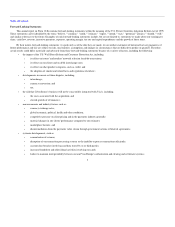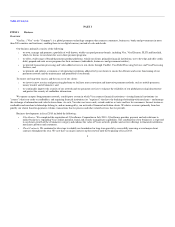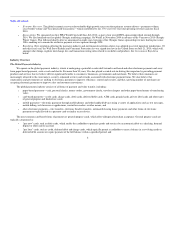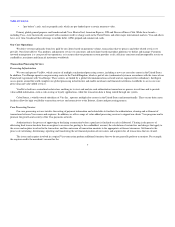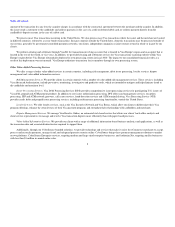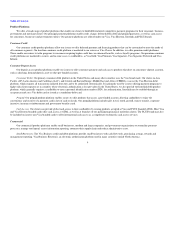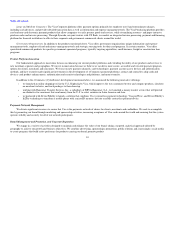Visa 2010 Annual Report Download - page 14
Download and view the complete annual report
Please find page 14 of the 2010 Visa annual report below. You can navigate through the pages in the report by either clicking on the pages listed below, or by using the keyword search tool below to find specific information within the annual report.
Table of Contents
We work with all participants in the payment system to ensure any entity that transmits, processes or stores sensitive card information takes necessary
steps to secure that data and protect cardholders. For example, Visa mandates protection of PIN data through use of the Triple Data Encryption Standard and
works with the payments industry to manage the Payment Card Industry Data Security Standards (PCI DSS). There has been significant progress in growing
industry adoption of PCI DSS with more than 95 percent of the largest U.S. merchants validating compliance annually.
Interchange Reimbursement Fees
Interchange represents a transfer of value between the financial institutions participating in an open-loop payments network such as ours. On purchase
transactions, interchange reimbursement fees are paid to issuers by acquirers in connection with transactions initiated with cards in our payments system. We
set default interchange rates in the United States and other regions. In certain jurisdictions, interchange rates are subject to government regulation. Although
we administer the collection and remittance of interchange reimbursement fees through the settlement process, we do not receive any portion of interchange
reimbursement fees. Interchange reimbursement fees are often the largest single component of the costs that acquirers charge merchants in connection with
the acceptance of payment cards.
We believe that default interchange reimbursement fees are an important driver of system volume and value, and promote the efficient operation of our
payments network by enabling both the issuer and the acquirer to understand the economics of a given transaction before entering into it, and by giving our
clients an alternative to negotiating transfer pricing with each other. By establishing and modifying default interchange rates in response to marketplace
conditions and strategic demands, we seek to ensure a competitive value proposition for transactions using our cards in order to encourage electronic
transactions and to maximize participation in the Visa payments system by issuers and acquirers and, ultimately, consumers and merchants. We believe that
proper management of interchange rates benefits consumers, merchants, our financial institution clients and us by promoting the overall growth of our
payments network in competition with other payment card systems and other forms of payment, and by creating incentives for innovation, enhanced data
quality and security.
Interchange reimbursement fees and related practices have come to the attention of, or have been or are being reviewed by, regulatory authorities and/or
central banks in a number of jurisdictions, including, for example, Australia, Canada, Brazil and South Africa. In the United States in particular, the Wall
Street Reform and Consumer Protection Act was signed into law on July 21, 2010 and will impact interchange fees related to debit card products. We are
currently devoting substantial management and financial resources to explain the importance of and defend interchange reimbursement fee practices in these
geographies. See Item 1A—Risk Factors—Interchange reimbursement fees and related practices are subject to significant legal and regulatory scrutiny
worldwide, and resulting regulations may have a material adverse impact on our revenues, our prospects for future growth and our overall business, and
Item 8—Financial Statements and Supplementary Data—Note 22—Legal Matters elsewhere in this report.
Merchant Discount Rates. Merchants do not pay interchange reimbursement fees. A merchant's cost of acceptance is determined by its acquirer and is
called a merchant discount or merchant discount rate. The merchant discount typically covers the costs that acquirers incur for participation in open-loop
payments networks, including those relating to interchange, and compensates them for various other services they provide to merchants. Merchant discount
rates and other merchant fees are set by our acquirers without our involvement and by agreement with their merchant clients and are established in
competition with other acquirers, other payment card systems and other forms of payment. We do not establish or regulate merchant discount rates or any
other fees charged by our acquirers.
13


